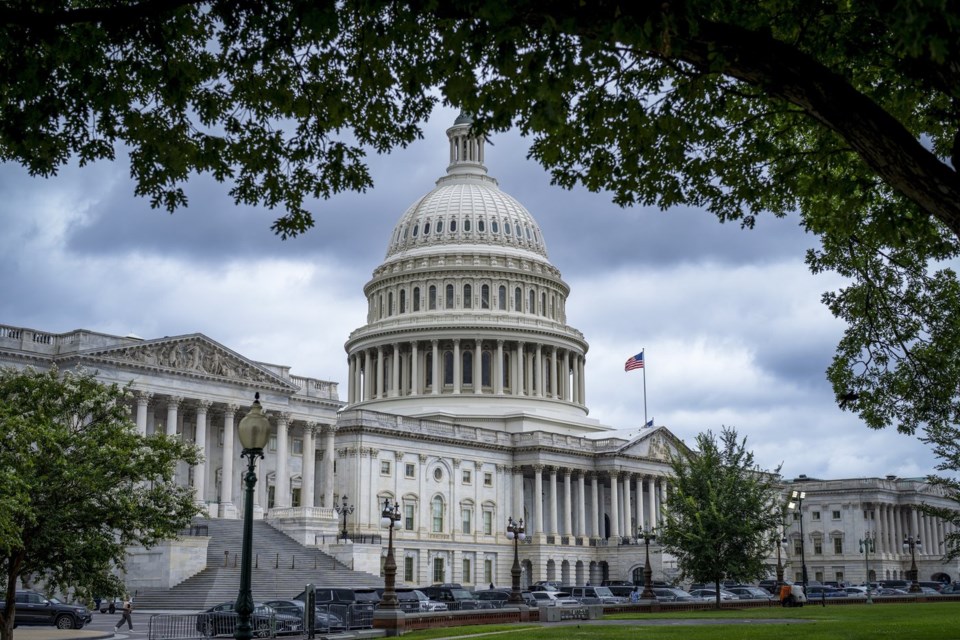WASHINGTON (AP) — Senate Republicans worked Tuesday to slightly scale back President Donald Trump's request to cancel $9.4 billion in previously approved spending as they tried to build momentum for the package before two key procedural votes in the evening.
They agreed to amend the package to take out Trump's proposed cuts to a program known as PEPFAR. The program is credited with saving millions of lives since its creation under then-President George W. Bush to combat HIV/AIDS.
The change could help the bill's prospects. Congress has until Friday to get a bill to the president’s desk for his signature or the spending stands.
The president is looking to claw back money for foreign aid programs targeted by his Department of Government Efficiency and for the Corporation for Public Broadcasting. The change preserving about $400 million for PEPFAR takes the total savings in the measure down to about $9 billion.
“When you’ve got a $36 trillion debt, we have to do something to get spending under control," said Senate Majority Leader John Thune, R-S.D.
The White House tries to win over skeptics
Republicans met with Russ Vought, the director of the White House Office of Management and Budget, during their weekly conference luncheon as the White House worked to address their concerns. He fielded about 20 questions from senators. There was some back and forth, but many of the concerns were focused on working toward a resolution, either through arrangements with the administration directly or via an amendment to the bill, said Sen. John Hoeven, R-N.D.
The White House campaign to win over potential holdouts was having some success. Sen. Mike Rounds, R-S.D., tweeted that he would vote to support the measure after working with the administration to “find Green New Deal money that could be reallocated to continue grants to tribal radio stations without interruption.”
Some senators are worried that the cuts to public media could decimate many of the 1,500 local radio and television stations around the country that rely on some federal funding to operate. The Corporation for Public Broadcasting distributes more than 70% of its funding to those stations.
Sen. Susan Collins, the Republican chair of the Senate Appropriations Committee, said that the substitute package marked “progress,” but she still raised issues with it, particularly on a lack of specifics from the White House. She questioned how the package could still total $9 billion while also protecting programs that Republicans favor.
Democrats warn of the consequences
Democrats are expected to unanimously oppose the package. They see the president’s request as an effort to erode the Senate filibuster. They also warn it’s absurd to expect them to work with Republicans on bipartisan spending measures if Republicans turn around a few months later and use their majority to cut the parts they don’t like.
“It shreds the appropriations process,” said Sen. Angus King, an independent from Maine who caucuses with Democrats. “The Appropriations Committee, and indeed this body becomes a rubber stamp for whatever the administration wants.”
Democrats also scoffed at the GOP's stated motivation for taking up the bill. The amount of savings pales compared to the $3.4 trillion in projected deficits over the next decade that Republicans put in motion in passing Trump's big tax and spending cut bill two weeks ago.
“Now, Republicans are pretending they are concerned about the debt," said Sen. Patty Murray, D-Wash. “So concerned that they need to shut down local radio stations, so concerned they are going to cut off ‘Sesame Street.’ ... The idea that that is about balancing the debt is laughable.”
What's ahead in the Senate
If senators vote to take up the bill, it sets up the potential for 10 hours of debate plus votes on scores of potentially thorny amendments in what is known as a vote-a-rama. The House has already shown its support for the president’s request with a mostly party line 214-212 vote, but if the Senate amends the bill, it will have to go back to the House for another vote.
“We're encouraging our Senate partners over there to get the job done and to pass it as it is,” House Speaker Mike Johnson said Tuesday. “That's what we did.”
Republicans who vote against the measure also face the prospect of incurring Trump's wrath. He has issued a warning on his social media site directly aimed at individual Senate Republicans who may be considering voting against the rescissions package. He said it was important that all Republicans adhere to the bill and in particular defund the Corporation for Public Broadcasting.
“Any Republican that votes to allow this monstrosity to continue broadcasting will not have my support or Endorsement,” he said.
____
Congressional correspondent Lisa Mascaro and staff writer Stephen Groves contributed to this report.
Kevin Freking, The Associated Press



